Greek Names are more common than you think! Your very own name could be Greek and you might not even know it! Luckily you can find out for sure with Greek Name Finder + Generate a Greek name below!
So whether you are curious to discover the Greek roots of your own name or perhaps, you are specifically looking for Greek baby names, this post is for you!
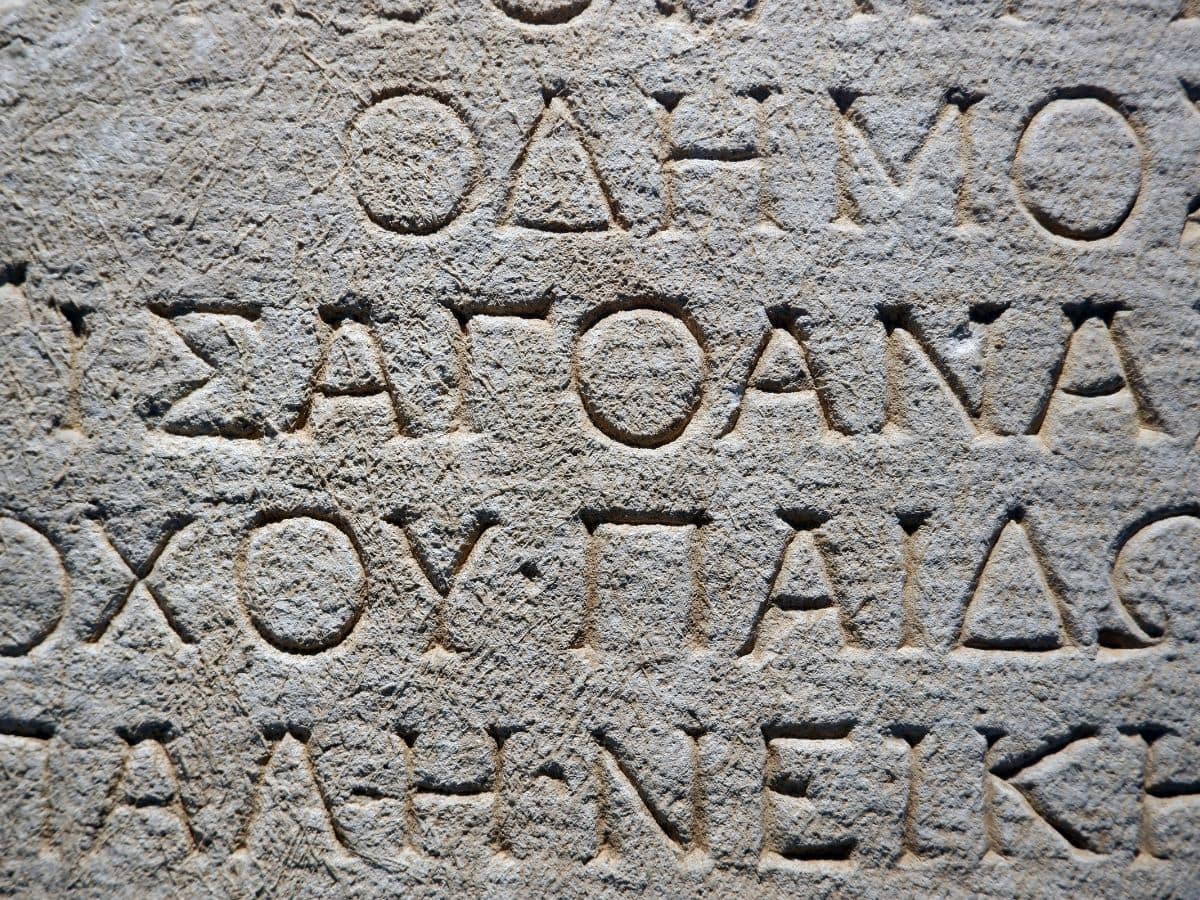
I was intrigued by the melodious cadence of Greek names when I found out my own name, Melissa, was a Greek name! Melissa, in Greek, means Honey Bee.
This had me wondering about other names in English, and if might translate into the language of philosophers, gods, and ancient wisdom.
This guide can help you find the perfect Greek name to bestow upon a character in your baby, pet, next novel, or screenplay.
Whatever your motivation, you’ve landed in the right place! This comprehensive guide on Greek names will explore their rich history, meanings, and cultural significance.
Whether you have Greek ancestry or just an admiration for these beautiful names, this post will provide you with an authentic experience.
Human-written content, by me, and nearly all original images, unless stated. Posts could have affiliate links to help offset the cost of maintaining this blog. When you click on a link, we receive a small commission. This is at no extra cost to you. See Our Affiliate Policy and Advertiser Disclosure for more info.
Brief History of Greek Names
In Ancient Greek history, the name dates back over three millennia, intertwined with the rich tapestry of Greek mythology, philosophy, and civilization.
From ancient epics like Homer’s “Iliad” and “Odyssey” to the classical Greek period. These names were not merely labels but carried profound meanings, familial significance, and connections to deities or heroic traits.
They often reflected virtues like wisdom, courage, and beauty, or were inspired by nature, such as the sea, sky, or earth.
Importance of Names in Greek Culture
Today in Greek culture, a name is more than just an identifier; it’s a symbol. The Greek name honors family heritage, an embodiment of values, and a reflection of individual identity.
Naming ceremonies are celebrated and the choice of a name is a thoughtful process.
Names are typically passed down through generations, carrying with them familial pride and cultural continuity.
Many Greek names also bear religious significance, linked to Orthodox Christian saints or ancient gods and goddesses, further reinforcing the cultural and spiritual connections.

What a “Name Day” Is in Greece!
I learned about Name Days when I visited Athens last November. In Greece, a name day (or “εορτές” in Greek) is a celebration of a particular saint’s feast day in the Eastern Orthodox Church.
Instead of celebrating individual birthdays as is common in many Western cultures, Greeks often celebrate the feast day of the saint after whom they were named.
This tradition is rooted in the strong ties between the Greek Orthodox Church and Greek cultural identity.
Each saint in the Orthodox Christian calendar has an associated feast day, and people who share the name of that saint celebrate their name day on that date.
For example, individuals named “George” would celebrate their name day on April 23rd, the feast day of Saint George.
Here’s what a typical name day celebration might entail:

1. Spiritual Observance: Many Greeks attend church services on their name day, offering thanks and seeking blessings.
2. Receiving Well-Wishes: It is customary for friends and family to wish someone well on their name day. They might say “Χρόνια πολλά!” (Chronia polla), which means “Many years!” in English.
3. Hosting and Visiting: People celebrating their name day often host guests, offering sweets and refreshments. It’s also common for friends and family to drop by unannounced to offer congratulations.
4. Giving Gifts: Gifts are often exchanged on name days, although this can vary based on personal and family traditions.
5. Community Celebrations: In some areas, the name day of a particularly revered saint might be marked by community celebrations, including processions, fairs, and other festivities.
Apparently, name days are considered more significant than birthdays! Many Greek families celebrate the connection to one’s heritage, faith, and community.

Exploring Greek Names Meanings & The Greek Names Generator
This blog post aims to delve into the intriguing world of Greek names, exploring their meanings, origins, and cultural connotations.
And for those who wish to delve deeper or find a Greek name for themselves or a character, check out my unique Greek Names Generator! It is a fun tool designed to provide authentic Greek names along with their historical and cultural significance.
Is Your Name Greek? Find Out Here
Your name is a key part of your identity. If you’ve ever wondered about the Greek roots of your name or if you’re seeking to name a child, character, or even a business with a Greek touch, now is the time to explore.
Utilize the tools and information provided here, uncover the hidden meanings, and connect with a culture renowned for its wisdom, beauty, and complexity.
Don’t Have A Greek Name? Generate One Here!
Ancient Greek Names and Their Origins

Ancient Greek names have their roots in the rich traditions and mythology of ancient Greece. These names often carried profound meanings and were selected to reflect virtues, natural elements, or divine characteristics.
For example, the female name “Sophia” means wisdom, while “Alexander” means defender of the people.
Many ancient Greek names were also derived from the names of gods and goddesses, such as the beautiful name “Diana” from Artemis, the goddess of the hunt.
The etymology of these names offers a glimpse into the values, beliefs, and societal norms of ancient Greece, painting a vibrant picture of a civilization that revered intellect, beauty, and valor.
Influence on Western Cultures
The influence of these names reaches far beyond Greece’s borders. From the names of planets and scientific terminology to modern Western names and surnames, the Greek language’s impact is profound.
Names like “Catherine” from “Aikaterine” and “Nicholas” from “Nikolaos” have become staples in English and other European languages.
Many modern institutions, such as democracy and philosophy, also draw their names from the Greek words “dēmos” (people) and “Philosophia” (love of wisdom), respectively.
This influence signifies the lasting legacy of Greek culture and its foundational role in shaping the West.
Common Prefixes and Suffixes
The Greek name often contains specific prefixes and suffixes that carry unique meanings, allowing for a deeper understanding of the name’s essence.
For example, the prefix “theo-” refers to God, as in “Theodore,” meaning “God’s gift.” And the suffix “-dora” means gift, as in “Isadora,” meaning “gift of Isis.”
Understanding these components not only helps in deciphering the meanings of Greek words but also in appreciating the linguistic artistry and the underlying philosophy that each name conveys.
Connection to Mythology, Philosophy, and History
Names of Greek origin are inexorably tied to the country’s rich tapestry of mythology, philosophy, and history. Many names are drawn directly from legendary heroes, philosophers, or historical figures.
For example, “Achilles” is a name synonymous with courage and heroism from the Trojan War, while “Socrates” evokes thoughts of wisdom and philosophical inquiry.
And, then “Pericles” is said to bring to mind the golden age of Athenian democracy.
These connections create a living link between modern bearers of these names and the timeless stories, ideas, and values of one of history’s most influential civilizations.
Mythological Names (e.g., Apollo, Athena)
Interested in Greek Mythology? Mythological names are those derived from the ancient Greek pantheon and mythical figures.
They carry with them the stories, virtues, and symbolism associated with the characters they represent.
- Apollo: Named after the god of music, arts, knowledge, healing, and prophecy, Apollo represents the embodiment of ideal masculine beauty and intellect.
- Athena: Named after the goddess of wisdom, courage, and warfare, Athena symbolizes strength, wisdom, and dignity.

These names continue to be popular, reflecting a fascination with Greek mythology and the timeless values they represent.
Historical Names (e.g., Alexander, Helen)
Historical names are drawn from real figures in Greek history, who may have been rulers, philosophers, warriors, or other prominent individuals.

- Alexander: Named after Alexander the Great, the renowned military strategist and conqueror, this name symbolizes leadership, ambition, and greatness.
- Helen: Perhaps most famously associated with Helen of Troy, whose beauty sparked the Trojan War, this name has become synonymous with extraordinary beauty and grace.

These names carry with them the weight of history and the legacy of individuals who shaped Greek civilization.
Modern Greek Names
Popular Greek Names (e.g., Nikos, Eleni)
When you think about Modern Greek names, they might not have the epic resonance of mythological or historical ones but they are rooted in the same rich linguistic tradition.
- Nikos: A popular male name, derived from Nikolaos, meaning “victory of the people.” It reflects a sense of community and triumph.
- Eleni: A common female name, related to Helen, carrying the connotations of beauty and light.
These names demonstrate the continuity of Greek linguistic and cultural traditions, adapting ancient themes to contemporary contexts.
Unisex Names
If you’re looking for unisex names that can be used for individuals of any gender there are a couple to consider.
- Alexis: Meaning “defender” or “helper,” Alexis is a name that transcends gender barriers, embodying a sense of strength and support.
- Danae: Though traditionally female, it’s also used in a masculine context. Danae is derived from the mythological mother of Perseus, symbolizing divine favor and benevolence.
List of Popular Male Greek Names and Meanings
1. A classic Greek name is Nikos (Νίκος)**: Derived from Nikolaos, meaning “victory of the people.” A classic Greek Name
2. Another popular Greek male name is George, or (Γιώργος) in Greek. Georgios, meaning “farmer” or “earth-worker,” is associated with Saint George.
3. Dimitris, or (Δημήτριος) is from Demetrios. The meaning behind it is “follower of Demeter,” the goddess of agriculture.
4. Andreas (Ανδρέας): Meaning “manly” or “brave,” often associated with strength and courage.
5. Theo (Θεόδωρος): Short for Theodoros, meaning “God’s gift.”
Feminine Names Popular Female Greek Names and Meanings
1. A very popular name, Maria (Μαρία) the Greek form of Mary, is often associated with purity and devotion.
2. Eleni (Ελένη): Derived from Helen, meaning “light” or “torch,” symbolizing beauty and grace.
3. Katerina (Κατερίνα): From Aikaterine, meaning “pure,” a name that carries elegance and simplicity.
4. Sofia (Σοφία): Meaning “wisdom,” this name is associated with intelligence and insight.
5. Anna (Άννα): Greek form of Hannah, meaning “favor” or “grace.”
Unique Lesser-Known Names & Lesser-Used Names
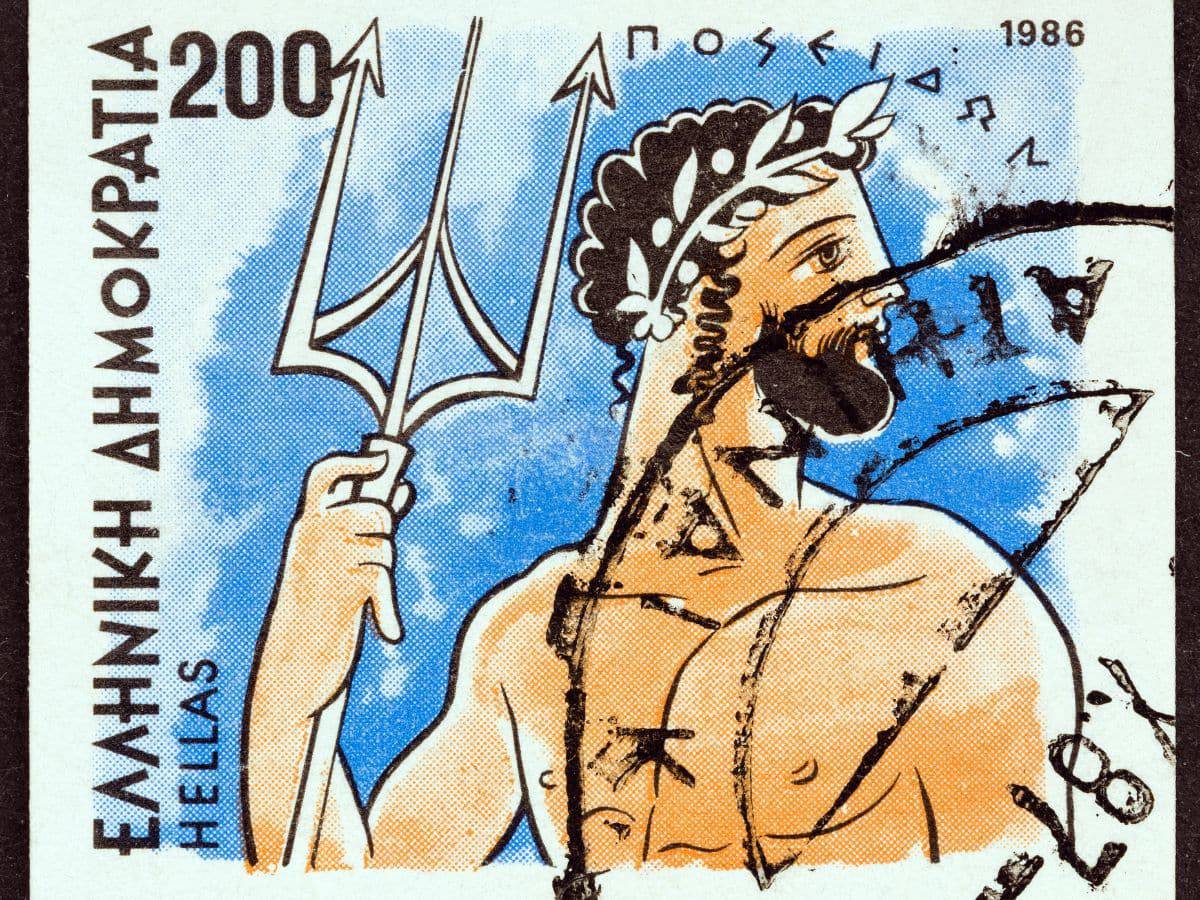
Looking for some unique Greek baby names?
1. Leander (Λέανδρος): A male name meaning “lion of a man,” famous from the tragic love story of Hero and Leander.
2. Chrysanthi (Χρυσάνθη): A female name meaning “golden flower,” embodying beauty and delicacy.
3. Xenon (Ξένον): A unique male name meaning “foreigner” or “guest,” often associated with hospitality, a key value in Greek culture.
4. Thalassa (Θάλασσα): A less common female name meaning “sea,” reflecting Greece’s deep connection with the ocean.
5. Evander (Εὔανδρος): Meaning “good man,” a name that is not only unique but carries a positive and virtuous connotation.
Greek names have influenced many cultures, and several common names used today have Greek origins that might not be immediately apparent.
A Common Name you didn’t know was a Greek name.
(Μέλισσα)
My name, “Melissa” is quite popular in various Western countries, and to my surprise, it has its roots in Greek.
It means “honeybee”, and has connections to Greek mythology, where Melissa was a nymph who discovered how to collect honey, and in some traditions, she was one of the nurses of Zeus.
The association with bees is not only a reflection of sweetness but also of industriousness and community, virtues that were celebrated in ancient Greece.
Many people may not immediately recognize “Melissa” as having a Greek origin or its symbolic connection to nature and mythology.
I only found out the meaning when I was on a day trip from Athens and the guide pointed it out.
It serves as a subtle example of the enduring influence of the Greek language and culture in the broader world.
A Rare Greek Name
Calliope (Καλλιόπη)
Calliope is a beautiful and somewhat rare name in contemporary Greece. In ancient Greek mythology, Calliope was one of the nine Muses and was the Muse of epic poetry and eloquence.
It means “beautiful-voiced” from the Greek words “kallos,” meaning beautiful, and “ops,” meaning voice.
Though this name carries with it the grace and culture of ancient Greece, it’s not frequently encountered in modern times.
Those with the name might find themselves explaining its origin and pronunciation. But how cool that they carry with them a name that’s imbued with the artistic and intellectual spirit of ancient Greek civilization.
Names with Meaning
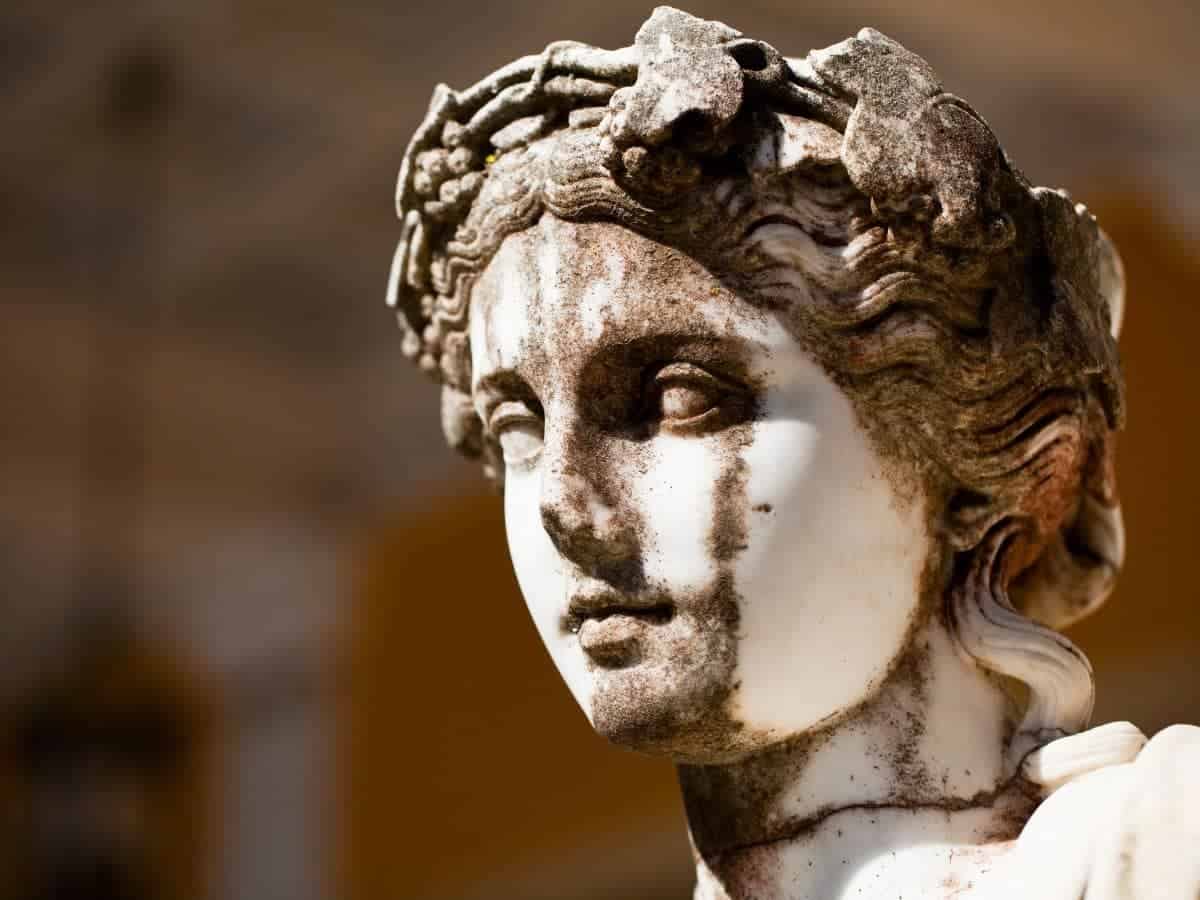
Greek Goddess
Looking for Greek girl names with meanings? Greek goddesses provide an extensive source of inspiration for beautiful and powerful names.
Each goddess’s name captures unique attributes, virtues, or domains over which she presided.
For instance, the name “Athena” resonates with wisdom and warfare, while “Demeter” evokes fertility and the harvest.
These names are not only aesthetically appealing but also filled with historical and mythical significance.
Greek Legend
Looking for Greek names tied to Greek legends? Heroic tales, moral lessons, complex characters, and many Greek names find their roots in these ancient stories.
Names like “Perseus,” “Hercules,” or “Odysseus” invoke the adventurous spirit, courage, and wisdom of their legendary bearers.
By choosing a name from Greek legend, parents can bestow upon their children a name rich with cultural heritage and timeless values.
First Mortal Woman
The story of Pandora, the first mortal woman according to Greek mythology. Pandora’s name means “all-giving” or “all-gifted,” and her legend is a complex tale of curiosity, hope, and resilience.
Goddess of War
The Goddess of war, Athena, is another influential figure whose name remains popular today.
Her name could be a powerful choice for a baby girl, reflecting qualities of leadership, courage, and intelligence.
Goddess of Love
A name that offers love and beauty is Aphrodite. Her name is synonymous with attraction, romance, and grace, and she played a central role in many Greek myths.
Naming a daughter after Aphrodite could evoke qualities of love, charm, and allure.

Greek Boy Names
1. Alexandros (Αλέξανδρος): Meaning “defender of the people,” this name was famously borne by Alexander the Great.
2. Leonidas (Λεωνίδας): Meaning “lion’s son,” a name that resonates with bravery and leadership.
3. Nikos (Νίκος): Derived from Nikolaos, meaning “victory of the people,” a widespread name in Greece.
Greek Girl Names
1. Zoe (Ζωή): Meaning “life,” Zoe is a classic both simple and profound.
2. Daphne (Δάφνη): Meaning “laurel,” associated with both the tree and the mythological nymph pursued by Apollo.
3. Katerina (Κατερίνα): Derived from Aikaterine, meaning “pure,” a timeless name embodying elegance.
Greek Baby Boy Names
If you are looking for strong and meaningful names for boys with Greek heritage, consider:
1. (Θεόδωρος): Short for Theodoros, meaning “God’s gift.”
2. Andreas (Ανδρέας): Meaning “manly” or “brave,” often associated with strength.
3. Yiannis (Γιάννης): A Greek form of John, meaning “God is gracious.”
Cool Greek Names
These names represent a blend of traditional Greek roots with a modern flair:
1. Xenon (Ξένον):
A unique male name meaning “foreigner” or “guest.”
2. Thalassa (Θάλασσα):
A less common female name meaning “sea.”
3. Orion (Ωρίων):
Known for the famed hunter in Greek mythology
4. Calista (Καλλιστώ):
A feminine name meaning “most beautiful,” derived from the word “kallista.”
Names of the Greek Gods
The names of Greek gods and goddesses have transcended time, continuing to captivate us with their powerful symbolism and rich meanings.
Here’s an overview of some of the principal Greek deities, their domains, and the significance of their names:

Zeus (Ζεύς)
- Domain: King of the Gods, god of the sky, thunder, and justice.
- Significance: The name Zeus is related to the ancient Greek word for “bright” and symbolizes his role as a celestial and authoritative figure.
Hera (Ἥρᾱ)
- Domain: Queen of the Gods, goddess of marriage and family.
- Significance: Hera’s name is thought to be related to the Greek word for “lady” or “mistress,” emphasizing her queenly status.
Poseidon (Ποσειδῶν)
- Domain: God of the sea, earthquakes, and horses.
- Significance: The name Poseidon might be connected to the Greek word for “husband” or “lord,” reflecting his dominion over the sea. I highly recommend visiting the Temple of Poseidon if ever in Athens.
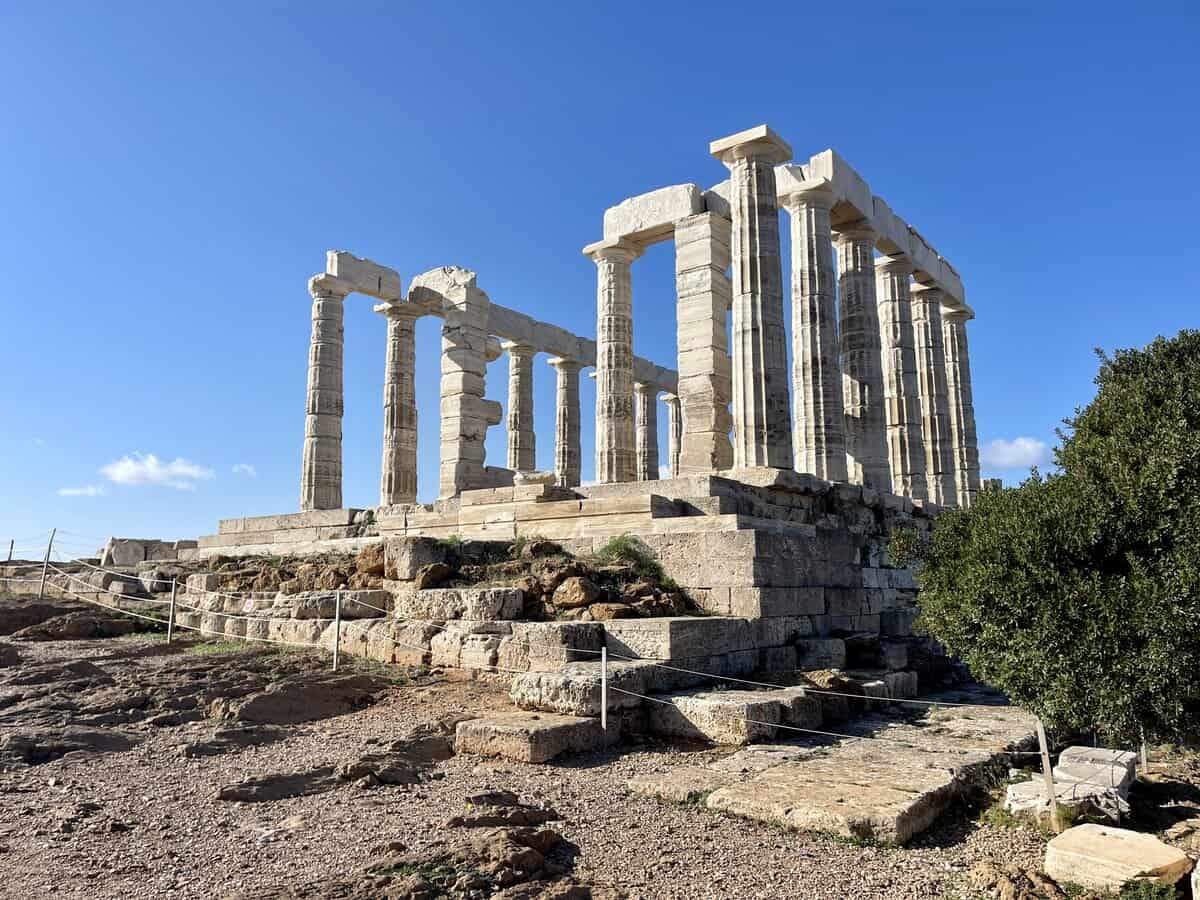
Athena (Ἀθηνᾶ)
- Domain: Goddess of wisdom, courage, and warfare.
- Significance: Athena’s name may be related to the city of Athens, with which she was closely associated, or to the Greek word for “mind” and “intellect.”
Apollo (Ἀπόλλων)
- Domain: God of music, arts, prophecy, and the sun.
- Significance: Apollo’s name is possibly related to the Greek word for “assembly” or “unity,” symbolizing harmony and balance.
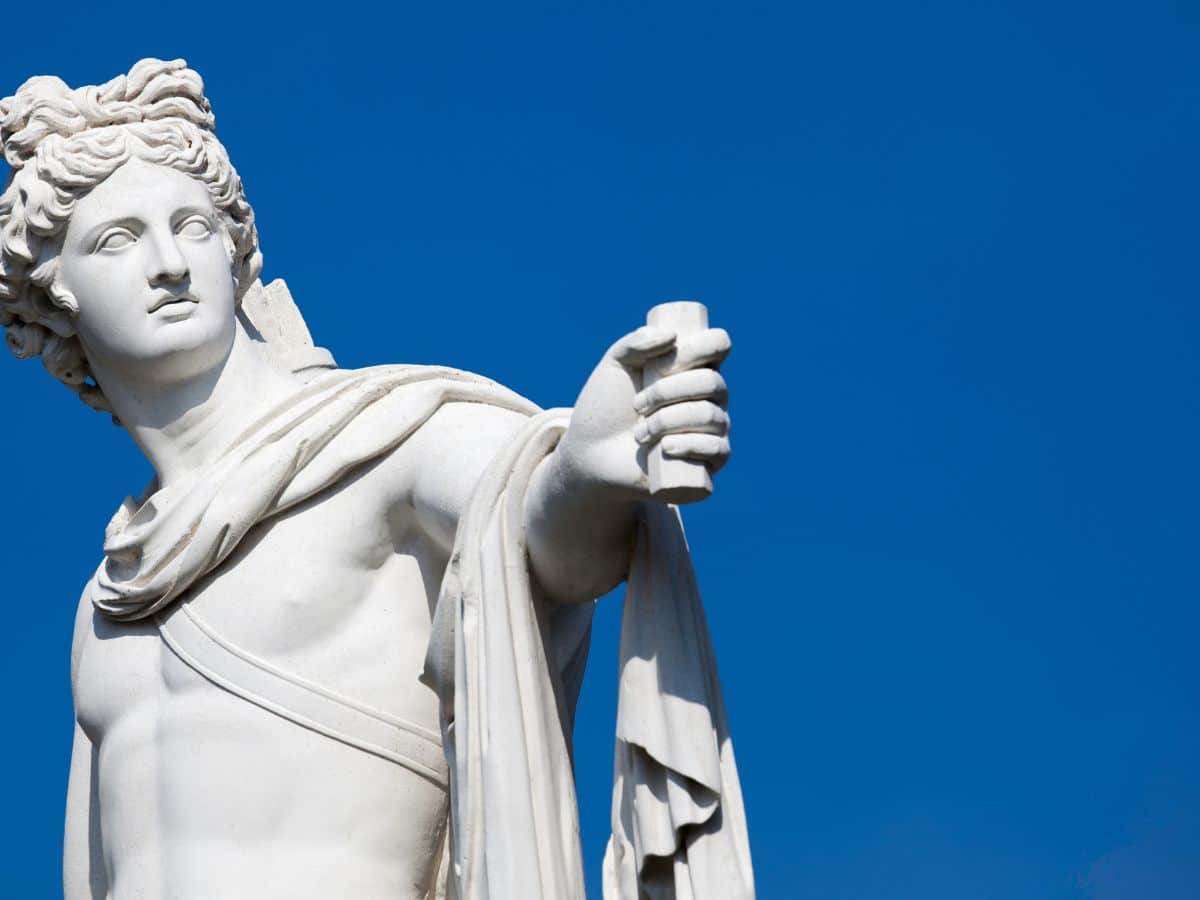
Artemis (Ἄρτεμις)
- Domain: Goddess of the hunt, wilderness, and childbirth.
- Significance: The meaning of Artemis’ name is debated, but it may be connected to the Greek word for “safe” or “butcher.”
Aphrodite (Ἀφροδίτη)
- Domain: Goddess of love and beauty.
- Significance: Her name might be derived from “aphros,” meaning “foam,” referring to her mythical birth from the sea foam.
Ares (Ἄρης)
- Domain: God of war.
- Significance: Ares’ name may be related to the Greek word for “bane” or “ruin,” reflecting his destructive nature.
Hermes (Ἑρμῆς)
- Domain: Messenger of the gods, god of trade, thieves, and travel.
- Significance: Hermes’ name may be derived from the Greek word for “boundary” or “stone heap,” symbolizing his role as a connector between realms.
Hades (Ἅιδης)
- Domain: God of the Underworld and the dead.
- Significance: The name Hades might be related to the Greek word for “invisible,” fitting his shadowy realm.
These names echo the attributes, powers, and domains of each deity, weaving a complex tapestry of meaning, culture, and mythology.
They continue to inspire literature, art, and even modern naming trends, testifying to the enduring appeal of Greek mythological figures and the profound human themes they represent.
Planning a Trip to Greece?
Greece:
- Solo Trips to Greece
- Greece Travel Guide
- Ultimate Greece Travel Guide
- 15 Best Greek Islands For Solo Travel
- 9 Best Greek Islands for Foodies & Wine Lovers + Map
- Solo Female Packing List For Greece: Summer & Winter
- The Best Private Airport Transfer From Athens Airport
- Affordable Greek Islands Near Mykonos
- Best & Hottest Greek Islands to Visit in May
Greek Islands Related Posts:
Rhodes & Symi Island
- Rhodes & Symi Island Travel Guide Itineraries
- 7 Best Wine Tasting Tours in Rhodes Greece
- How To Book The Fast Boat To Symi From Rhodes
- The Best Way To Get A Rhodes Rental Car
- 17 Best Things to Do in Symi Island Greece + Map
Crete Island
Milos Island
- All The Best Things to Do in Milos By Area + Map
- Renting a Car in Milos: What You Need To Know
- The Perfect 4 Days in Milos Itinerary Guide + Map
- 12 Best Boutique Hotels In Milos Greece in
- A Private Luxury Boat Tour to Kleftiko Milos
- Best Milos to Athens Ferry Travel Guide
Sifnos Island
- Best Guide to Sifnos Greece: Everything To Do + Map
- A Guide to Booking a Ferry From Athens To Sifnos
- Flight From Athens to Sifnos By Private Helicopter
- Honest Review of Nival Boutique Hotel in Sifnos
- Best Beaches in Sifnos, Greece
Serifos Island
Naxos
- Renting a Car in Naxos: Exploring the Pros and Cons
- Best Naxos Bus Tour Highlights of Idyllic Villages
- 10 Best Villages to Visit in Naxos
Mykonos
- Ultimate Solo Travel Guide Mykonos
- Is Mykonos Expensive?
- How to Get Around in Mykonos
- Day Trips From Mykonos
Athens
- What To See In 2 Days In Athens Itinerary + Map
- What to Expect Visiting Athens in November
- What to Expect When Visiting Athens in December
- 10 Best Athens Hotels With Rooftop Pools
- How To Visit Athens On A Budget + Free Calculator
- 7 Easy Day Trips From Athens City Center
- Best Half-Day Tour: Athens To Temple Of Poseidon
- Coco-Mat Athens BC Hotel Review
- The Best Ferry From Athens To Hydra Island in
- Ultimate Athens Solo Travel Guide + Free Map
- Easy Greek Words and Phrases to Learn for Travel
- Is Your Name Greek? Greek Names Generator & Meanings
- 18 Pros & Cons of Living in Athens Greece by an Expat
- Best Cafes in Athens by Neighborhood
🫶 Did you enjoy this article? Help fellow travelers and share this guide with the buttons below!






